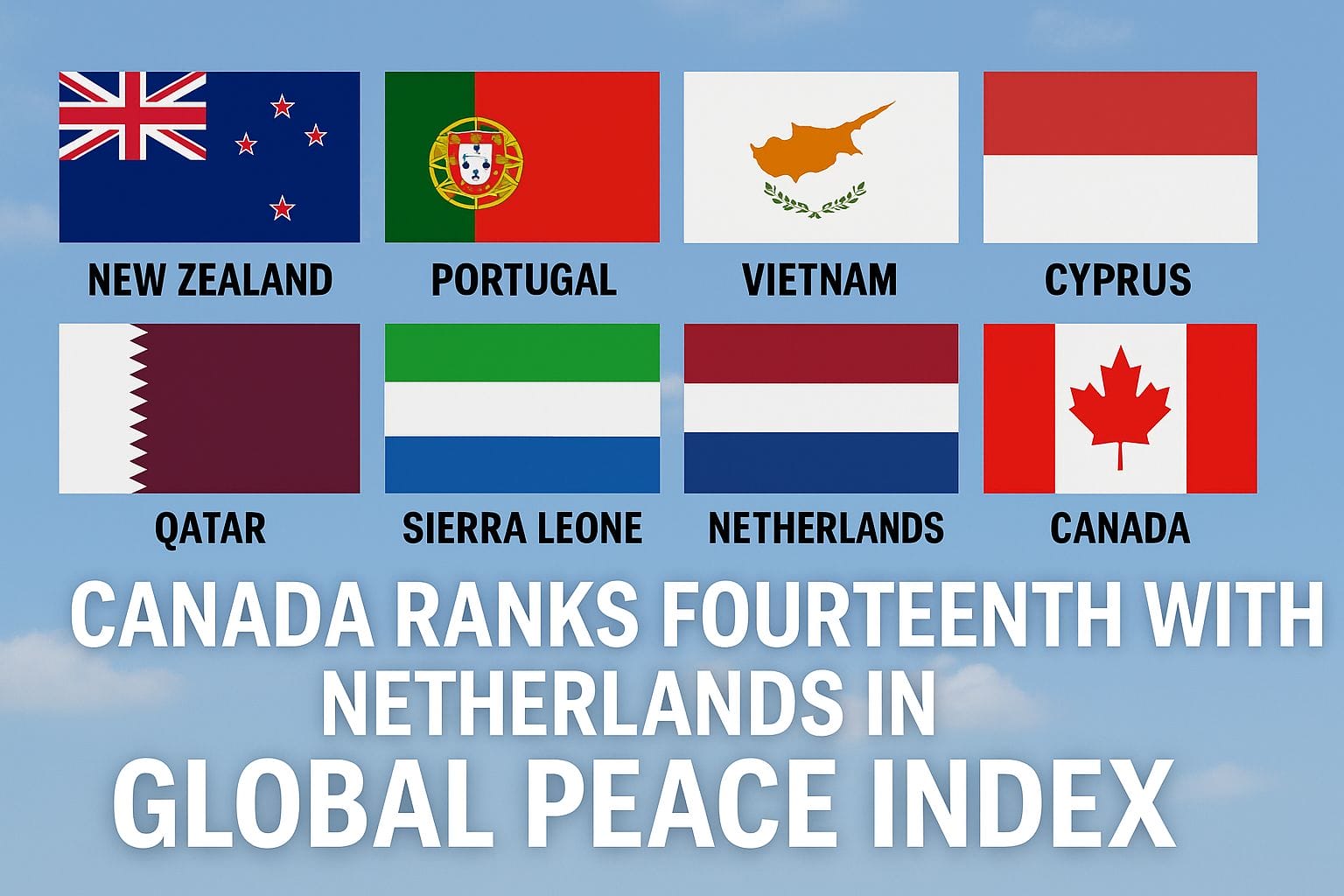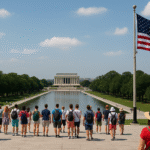Canada has once again affirmed its reputation as a beacon of peace and stability, securing the 14th spot on the 2025 Global Peace Index (GPI), released by the Institute for Economics and Peace. Tied with the Netherlands, Canada remains the highest-ranked country in North America—positioning itself as a global frontrunner for safe, sustainable tourism amid a backdrop of increasing global volatility.
This year’s rankings not only highlight Canada’s enduring appeal but also underscore the rise of an unexpected but compelling group of nations gaining traction in the peace and tourism sectors. Canada joins a distinguished list that includes New Zealand, Portugal, Vietnam, Cyprus, Qatar, Sierra Leone, and France—each recognized for their growing political stability and peaceful environments, which are becoming increasingly critical for international travelers in 2025.
Tourism Meets Tranquility: Why Canada’s GPI Ranking Matters
Although Canada dropped slightly from its 11th position in 2024, the move to 14th is less a cause for concern than a reflection of shifting global dynamics. The index attributes Canada’s modest slip to localized upticks in urban crime, yet its overall standing remains robust. The country’s democratic resilience, strong institutions, and global diplomacy ensure it continues to outpace its North American neighbors in peace metrics.
This designation carries profound implications for Canada’s tourism sector. In a world where travelers increasingly prioritize security, Canada’s peaceful stature is translating into heightened traveler confidence, stronger booking trends, and renewed marketing opportunities for its provinces and cities.
New Zealand, Portugal, and Vietnam: Canada’s Peaceful Tourism Peers
Sharing the GPI spotlight with Canada are familiar tourism darlings like New Zealand and Portugal—countries long hailed for their safety, natural beauty, and strong infrastructure. Vietnam and Cyprus, meanwhile, are being recognized for maintaining regional stability despite complex geopolitical surroundings. Sierra Leone’s rise is notable for signaling an African renaissance in peace building, while Qatar continues its post-World Cup transformation into a hub for modern hospitality.
Together, these countries form a new axis of peaceful tourism—offering travelers alternative destinations where safety, culture, and responsible development converge.
Global Peace in Decline: Canada’s Safety Stands Out
The 2025 Global Peace Index confirms a sobering trend: overall peace worldwide has deteriorated to its lowest levels since the index began in 2008. Increased conflict, polarization, and militarization dominate the global landscape—making Canada’s calm even more valuable in contrast.
While regions like Eastern Europe and the Middle East remain troubled by political and security crises, Canada continues to provide a stable refuge for international tourists. Tourism boards are capitalizing on this positioning by framing Canada as a destination not only rich in experiences but also rooted in reliability.
Tourism Leaders Embrace Peace-Based Marketing
The correlation between peace and tourism has never been clearer. Airlines, hospitality brands, and tour operators in Canada are increasingly incorporating the Global Peace Index into their messaging. Whether promoting Ontario’s urban sophistication, British Columbia’s wellness retreats, or Alberta’s outdoor adventure, the emphasis on safety is resonating with both domestic and international travelers.
Destinations like Toronto, Montreal, and Vancouver are spotlighting their diverse, inclusive, and well-regulated environments—traits that give modern travelers the confidence to book extended stays, attend events, and explore off-the-beaten-path locales.
Canada’s Wonderland and Theme Parks: Safe Thrills for U.S. Travelers
As cross-border tourism resumes its full momentum post-pandemic, U.S. travelers are turning to Canada for thrilling and secure vacation alternatives. Canada’s Wonderland, located just north of Toronto in Vaughan, remains a major draw for American tourists seeking adrenaline with peace of mind. Its record-breaking rides like the Leviathan and Yukon Striker pair North America’s roller coaster culture with Canadian hospitality and cleanliness standards.
Montreal’s La Ronde—part of the Six Flags family—adds a French-Canadian twist, offering exhilarating coasters, riverside views, and bilingual charm. Summer highlights include the globally renowned L’International des Feux Loto-Québec fireworks competition.
Meanwhile, regional favorites such as Calaway Park in Calgary and Playland in Vancouver cater to families with low-crowd, high-enjoyment experiences against stunning natural backdrops—offering an intimate alternative to the U.S. mega-parks.
Practical Tips for Visiting Canada in 2025
For American and international travelers planning their Canadian getaway, preparation remains simple and stress-free:
- Entry Requirements: Valid passports or enhanced driver’s licenses are accepted at most border crossings.
- Currency Advantage: The U.S. dollar often offers favorable exchange rates, increasing travel value.
- Language: English is widely spoken nationwide; French is dominant in Quebec, adding a bilingual edge.
- Cuisine & Culture: Explore Canada’s local flavors—from poutine to maple sweets—alongside rich Indigenous and multicultural heritage.
A Safer Future for Travel: Why Canada Is Leading the Way
Canada’s consistent GPI performance isn’t just a statistic—it’s a foundation for a thriving tourism economy. Cities like Ottawa, Halifax, and Victoria are rapidly gaining attention as destinations where visitors can explore in comfort and confidence. As the country continues to invest in sustainability, public health, and inclusive tourism, its peaceful reputation grows even stronger.
From Niagara Falls to the Yukon wilderness, and from world-class theme parks to tranquil lakeside resorts, Canada offers more than beauty—it offers peace, in every sense.
In a global tourism landscape shaped by unrest and uncertainty, Canada’s peaceful brand is not only resilient—it’s leading the way.
For more travel news like this, keep reading Global Travel Wire
















